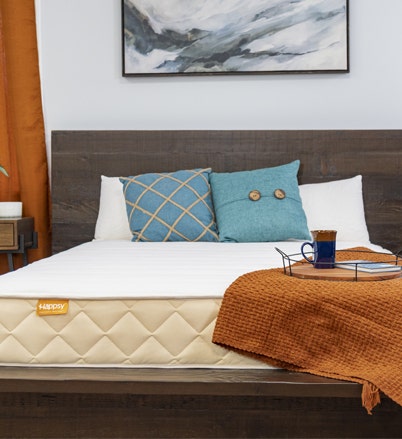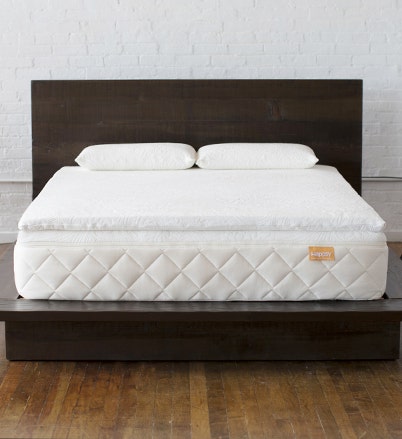
For couples, roommates and family members, few sleep-related topics cause more tension than the snooze debate.
For snoozers, this is an absolutely necessary part of waking up … or so they think. For the other camp, the snooze button is just a loud, annoying noise disrupting the whole house – over and over again. Who's right? Let’s discuss!


Why do people hit the snooze button?
If you ask a snoozer why they do what they do, a common argument made is that it’s a slower, gentler way to wake up. However, the reality for many is that snoozing is just a way to procrastinate starting the day. But why procrastinate?
The answer may actually point to a deeper sleep-related issue. Some explanations include:
- Waking up too early
- Staying up too late
- Sleep disorders
- Mental health struggles
- Circadian rhythm disruption
If you suspect you may be suffering from a sleep or mental health disorder, you should set up an appointment with your healthcare provider. Happsy can help with tips on resetting your circadian rhythm or info on how much sleep you should get.
Does hitting the snooze button affect your body?
Okay, so we’ve covered why you might feel the urge to snooze in the morning … but what about how snoozing actually affects your body? Because it does, and not in any helpful ways.
Sleep cycle disruption
The main (and most serious) effect of hitting the snooze button is disrupting the sleep cycle. The sleep cycle consists of four unique stages:
- Stage 1 – The phase between wake and sleep, this stage is very light, lower quality sleep.
- Stage 2 – Here, sleep is slightly deeper than Stage 1. The body’s temperature begins to drop and heart rate slows.
- Stage 3 – Deep and restorative sleep begins here, known as slow-wave or delta sleep. Muscles relax, blood supply increases, and the body and brain begin to repair themselves
- Stage 4 – This is your REM sleep stage, which is only entered following the above stages and is most commonly associated with dreaming. Sleep is light here, but highly restorative.
As the night goes on, you spend more time in that restorative, high-quality REM stage. So, when your morning alarm goes off, it’s likely pulling you out of that REM sleep, leading to sleep inertia – aka, those groggy, sluggish, crabby feelings you experience when you first wake up.
If you snooze your alarm and go back to sleep, you may be diving right back into REM. But then nine minutes later your alarm goes off again, yanking you right back out of REM. This can actually lead to increased sleep inertia, lasting anywhere from 15 minutes to two hours, per the CDC.
Circadian rhythm disruption
Like we mentioned above, a confused circadian rhythm might be the reason you feel the urge to hit snooze. (Night owls, we’re talking to you here!) But did you know that hitting the snooze button can be the culprit for confusing your circadian rhythm, too?
Your circadian rhythm is your body’s sleep-wake schedule, governed by the sun. Basically, your body knows that darkness means it’s sleepy time and daylight means wakey, wakey, eggs and bakey.
So, when your alarm goes off and the sun is rising, you’re working in harmony with your circadian rhythm. But, when you hit the snooze button, you’re telling your body that darkness means sleep … and sunlight means sleep, too? You can probably see how this might be confusing.
A well-tuned circadian rhythm can make it easier to fall asleep with ease and wake up feeling refreshed. Disturbing your circadian rhythm does just the opposite. Let nature do its thing!


The bottom line … it doesn’t really help
Beyond your sleep cycle, the sorry truth of the matter is that those extra 10 minutes the snooze button buys you (or 20 minutes, or 30 minutes, etc.) aren’t actually helping you to feel more rested. The short spurts of time you sleep between alarms aren’t long enough to be restorative, and they can actually make you feel more tired when you wake.
So, to snooze or not to snooze? Our vote is no.


More ways snoozing may disrupt your day
The short answer is: stress! Most snoozers can probably relate to this one – accidentally hitting that snooze button one too many times in a half-asleep haze can lead to frantic wake-ups, rushed morning routines and tardiness. We’re all guilty of this one sometimes … but that doesn’t make it any less embarrassing when it happens.
And you’re probably not only stressing yourself out when you hit that snooze button. Odds are that your sleep partner doesn’t appreciate the repeated sound of your alarm going off every 10 minutes. Plus, if your alarm is particularly loud, it can disturb roommates and housemates as well.
3 Tips for how to stop hitting snooze
If you don’t feel the urge to snooze in the morning, good for you. Your sleep will thank you! And if you do feel the urge, never fear. You don’t have to fight the snooze button with pure willpower – check out these helpful tips!
1. Put your phone across the room
Do you use your phone alarm to wake up in the morning? Try keeping your phone out of arm’s reach when you sleep at night. When your alarm goes off, you’ll be forced to get out of bed to turn it off. At that point, you’re already standing up … may as well stay up!
Not to mention that sleeping away from your phone helps to fight the tendency of mindlessly scrolling social media in bed when you should be sleeping. Aside from stealing sleep time, the mindless scroll also exposes you to blue light, which further messes with your circadian rhythm.
2. Play into your circadian rhythm
Wake up as Mother Nature intended – with the sunrise. Waking up to light that gradually gets brighter helps to regulate your sleep-wake schedule, and makes waking up in the morning feel, well, natural! If your morning wake up call coincides with the sunrise, open your blinds and let the light in to help you wake up. And, if your wake up hour happens to fall before the sun’s, try using a light that mimics the sun.
3. Waking up better starts with better sleep
Practicing proper sleep hygiene can revolutionize your sleep experience. What is sleep hygiene, you may be asking? It’s a set of practices designed to help you achieve your best night’s sleep, every night. Sleep hygiene best practices include:
- Maintain a regular sleep schedule – even on weekends!
- Limit screen time before bed
- Avoid substances like alcohol and caffeine
- Practice a nightly bedtime routine


And, of course, never underestimate the power of a quality mattress on quality sleep. Happsy’s certified organic, crazy comfy bed-in-a-box just may be the secret to unlocking your best night’s sleep. Sleep Healthy, Wake Happy™ – and beat the snooze button!


